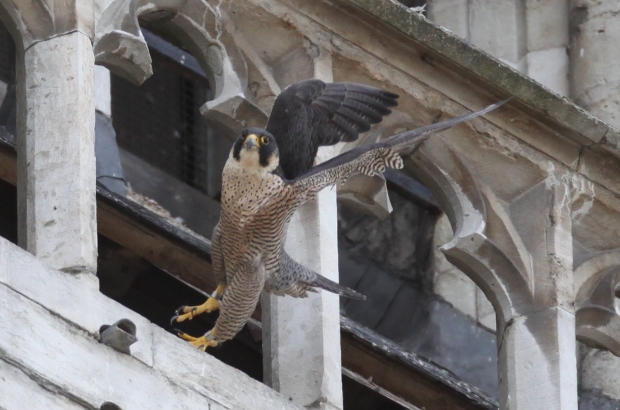- Daily & Weekly newsletters
- Buy & download The Bulletin
- Comment on our articles
Peregrine falcons back in Brussels to raise their families
At various 'historical' locations in Brussels, the peregrine falcons are back, according to a report by Bruzz. At the Cathedral of St Michael and St Gudula in the city centre, a breeding pair has returned while a falcon couple on the Église Saint-Job in Uccle are expected to welcome their babies in the coming days.
"In Brussels, spring is not announced by the arrival of the swallows, but by the fact that the peregrine falcons are starting to hatch their eggs on the tallest buildings in the city," says bird expert Didier Vangeluwe.
The ornithologists behind the blog Falcons for Everyone, which has cameras close to the nests on these buildings, have already observed at least 12 breeding pairs in the capital.
In addition to the peregrine falcons on the cathedral and the Saint-Job church, another breeding pair has returned to the town hall of Woluwe-Saint-Pierre. At those three locations, Falcons for Everyone has cameras set up, allowing bird of prey lovers to follow the breeding pairs live.
The blog also has a camera on the Solbosch campus of the ULB, but the falcon couple who set up home there in the spring of 2019 have moved this year to the Église Saint-Adrien, 650 meters away. So these birds have escaped the livestream for the time being. There are at least another eight nests in Brussels, including in the Basilica in Koekelberg.
The breeding period of a peregrine falcon is on average 32 days. The eggs of the pair in Uccle were laid on March 8, according to the experts at Falcons for Everyone. This means that the chicks will start hatching within a few days, perhaps on 9 April.
There have been peregrine falcons in the Église Saint-Job in Uccle since 2015. "This species was almost completely extinct in Europe,” Uccle's alderman of environment Maëlle De Brouwer told La Dernière Heure. “The population is increasing, but it's not yet enough to guarantee the long-term survival of the species."
On Place de Saint-Job, the Royal Belgian Institute of Natural Sciences (RBINS) organises four observation sessions on 10 April, 17 April, 8 May and 22 May from 16.30 to 18.30. The ornithologists of the RBINS founded the Falcons for Everyone project 18 years ago, in collaboration with the Commission for Ornithology of Watermael-Boitsfort.



















